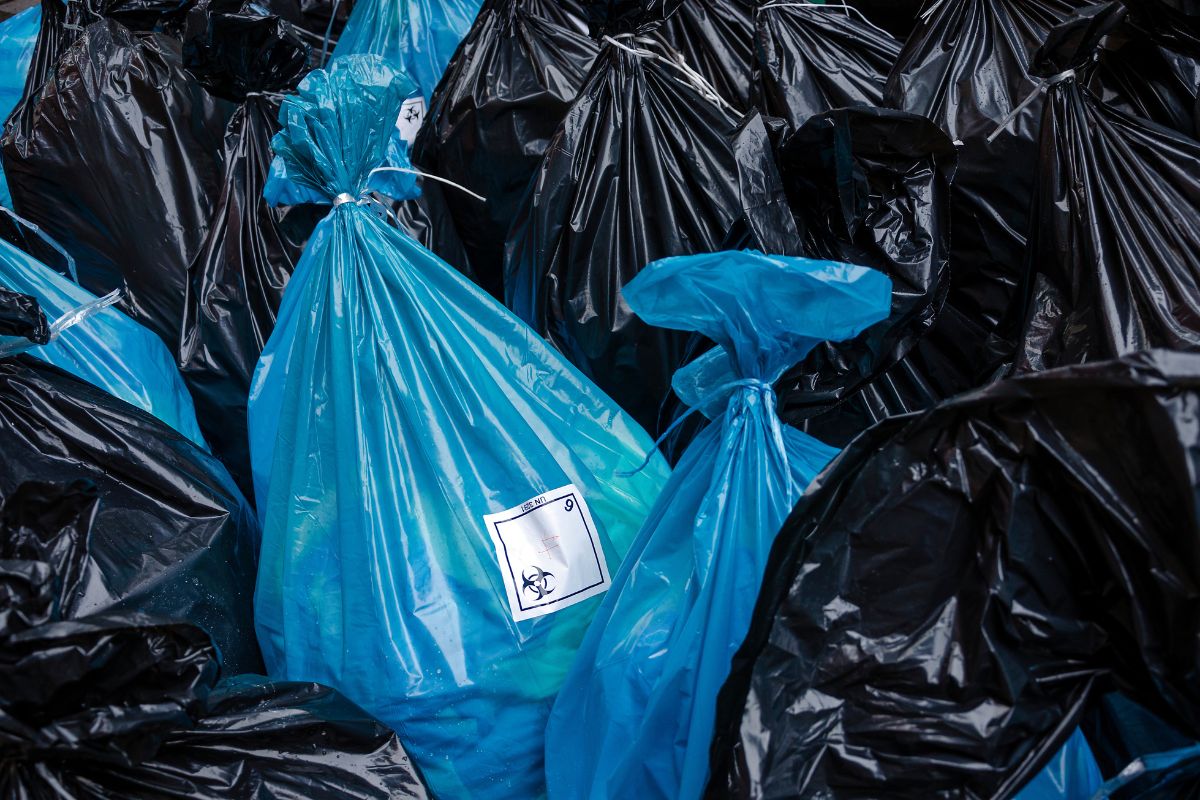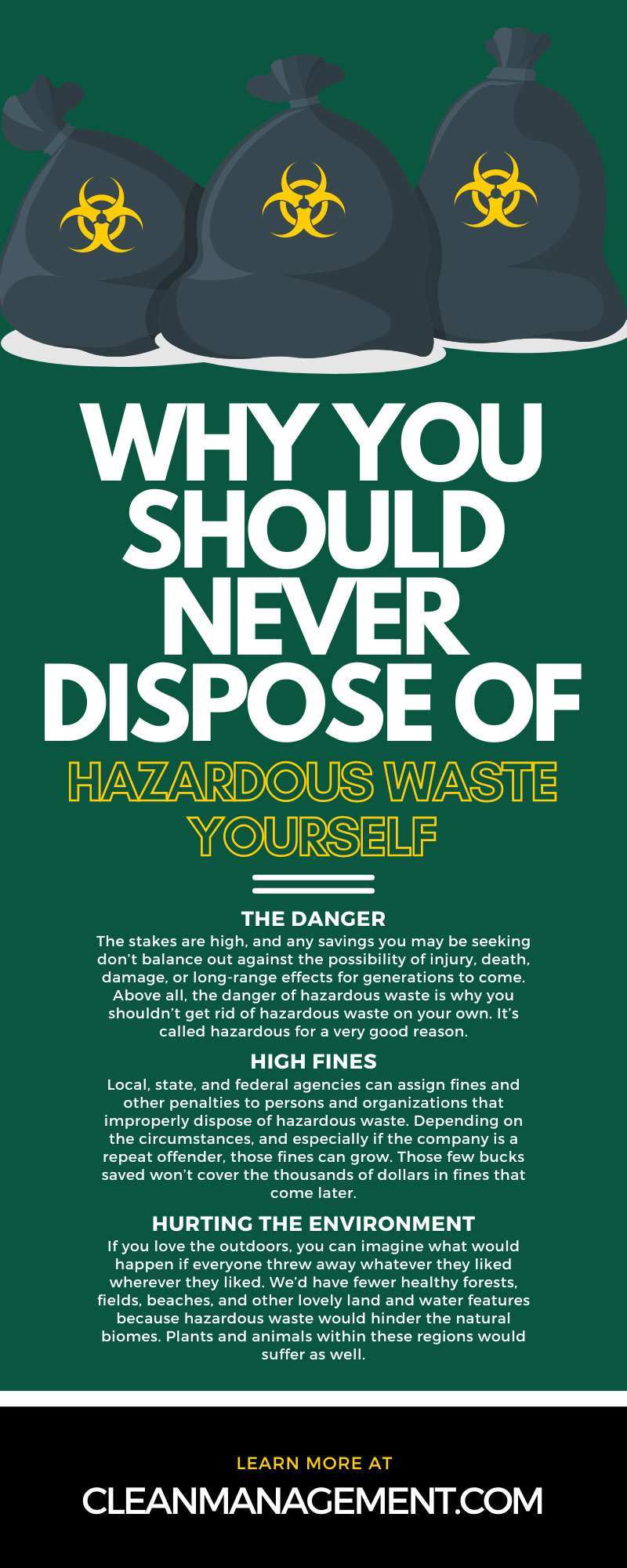Why You Should Never Dispose of Hazardous Waste Yourself

Hazardous waste isn’t something people encounter every day, so many assume they can handle it just like any other form of trash. Whether they’re cleaning out their home or handling the waste disposal aspect of their business, they might think they’re saving time and money by handling this waste themselves. However, disposing of hazardous waste is best left to experts with the experience, equipment, and facilities necessary to tackle the job. Read on to explore a few significant reasons why you should never dispose of hazardous waste yourself.
The Danger
Hazardous waste can affect the health and safety of the environment and the community at large. The toxicity, ignitability, corrosivity, and/or reactivity of hazardous waste make getting rid of it safely a gamble. In short, the stakes are high, and any savings you may be seeking don’t balance out against the possibility of injury, death, damage, or long-range effects for generations to come. Above all, the danger of hazardous waste is why you shouldn’t get rid of hazardous waste on your own. It’s called hazardous for a very good reason.
High Fines
Many people think they’ll save a few bucks by dumping waste into the local landfill or just leaving it somewhere for someone else to deal with. However, those savings won’t remain once government entities connect that waste with you and your company. Local, state, and federal agencies can assign fines and other penalties to persons and organizations that improperly dispose of hazardous waste. Depending on the circumstances, and especially if the company is a repeat offender, those fines can grow. Those few bucks saved won’t cover the thousands of dollars in fines that come later.
Hurting the Environment
If you love the outdoors, you can imagine what would happen if everyone threw away whatever they liked wherever they liked. We’d have fewer healthy forests, fields, beaches, and other lovely land and water features because hazardous waste would hinder the natural biomes. Plants and animals within these regions would suffer as well.
The question of where to put certain kinds of waste is a tricky one, and we should work toward generating less of it. But for now, we can continue to rely on our designated waste zones and protect natural spaces. Find a reputable waste disposal company that can remove hazardous waste without injuring the ecosystem.
It’s Likely Not Allowed
Companies and individuals need to handle waste disposal in certain ways, so it’s better to turn to professionals with the knowledge to navigate these disposal rules. In fact, many states have laws specifying that only professionals are allowed to perform that task. If caught disposing of waste improperly, you can receive fines for illegal dumping as well as further fines for being unlicensed and properly equipped for the job. Hazardous waste disposal is not a DIY job.
Human Error and Lack of Education
You might be aware of what the chemicals your company uses are capable of, but that’s no guarantee every employee assigned to disposal understands. Most of us are used to cleaning being a simple matter of sweeping and mopping up, throwing it all in a bag, and chucking it into the dumpster. Hazardous waste requires far more knowledge to handle. Clean-up crews must be aware of the way chemicals interact, what personal protective equipment (PPE) is necessary, how to create lab packs, and specialized methods of packing and disposal.
Leaving the task to individuals who are ignorant of the effects of the waste has serious consequences. It leaves you open to lawsuits, workman’s compensation claims, and higher insurance rates, as well as hospitalizations and even deaths. Not to mention the effects on those collecting, dumping, or otherwise encountering the waste elsewhere.
Surprise, It Doesn’t Save Time or Money
Getting rid of hazardous waste on your own might seem simple, but you’ll swiftly discover otherwise. It takes time, especially if you don’t know what you’re doing and don’t have the proper equipment to do it. Even if you’re doing everything (more or less) by the proverbial book, you’re just making extra work for yourself and your employees. You must organize, identify, label, pack, and move waste to the disposal facility. That’s not just downtime for you and employees—it’s an expenditure of not just sweat but also electricity, fuel, equipment, packing materials, and more. And even more time will go to waste if you must redo any steps.
Public Goodwill
You’re only as good as your reputation. Your clients, customers, and the surrounding community need to know they can trust you and your company. Part of maintaining that goodwill involves respecting and protecting the area where you do business. If you’re caught disposing of hazardous waste irresponsibly, your facility may not recover from the backlash. Despite the old saying, there is such a thing as bad publicity. You don’t want to be known as the company that doesn’t care about its clientele and the locality it serves.
It’s the Right Thing To (Not) Do
This point encapsulates all the above reasons. Hiring a cleaning company to handle the toil and requirements for getting rid of hazardous waste is simply ethical behavior. Finding a credentialed firm to correctly gather, pack, and remove your waste shows a sense of morality as well as good business sense. Customers will appreciate the care you put into your business operations, and your business will benefit. Cutting corners does no one any favors, particularly where toxic and hazardous waste is concerned.
Any Questions?
We’ve covered why you should never dispose of hazardous waste yourself. So, what’s the next step? If you need more information on hazardous waste cleanup services, contact us for a consultation. We’ve been in the waste management and handling business for well over three decades. We offer multiple services, including waste disposal, spill cleanup, transportation, and more, and serve multiple industries across the United States of America. Contact us today with your questions and projects, and we’ll go from there. Thank you, and we look forward to hearing from you soon!

